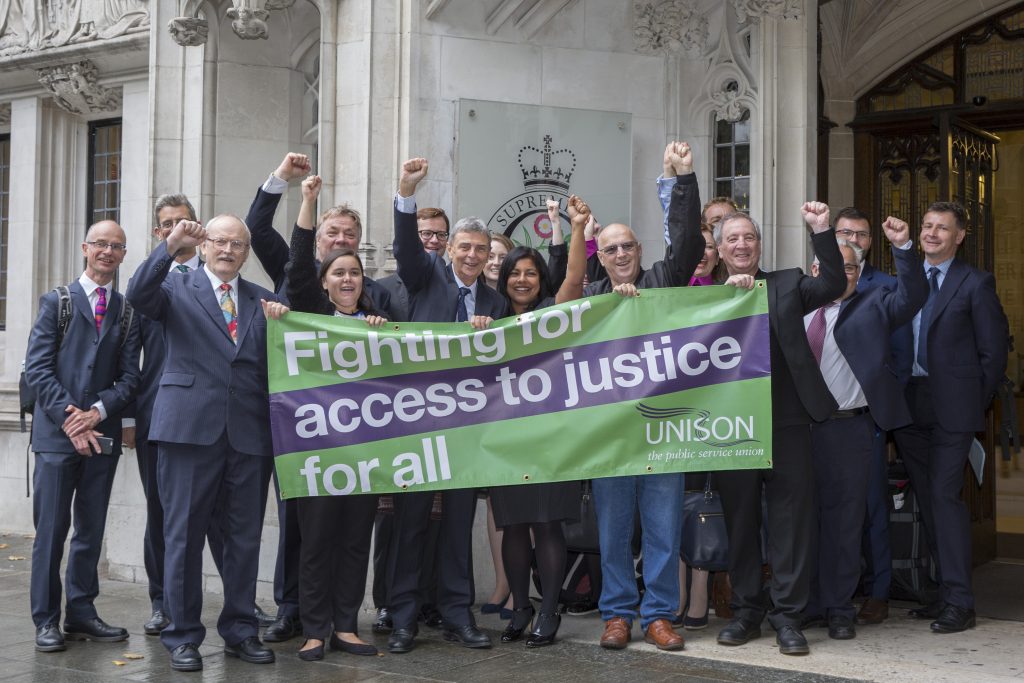by UNISON’s head of legal services Shantha David
The government is consulting on reintroducing fees in the employment tribunals (ETs). If this becomes law, employees and workers will have to pay a single fee of £55 – whether they are bringing the case by themselves or as part of a group – when seeking to enforce their employment rights against their employer.
An appeal to the employment appeal tribunal (EAT) by the party challenging an ET decision will also attract a fee of £55.
Employment tribunals – or industrial tribunals as they were known until 1998 – were set up in the 1970s to provide employees and workers with an informal and accessible forum for the enforcement of employment rights.
Employment law has developed considerably since the inception of the industrial tribunals, and the ET and EAT have jurisdiction to determine more than 70 types of employment claim. Each party has had to bear their own legal costs and these new proposals will not change that.
Unfortunately, the burden of fees to challenge an employer still rests on the shoulders of the worker/employee, even where they are successful. The ability of the winning party to recoup their fee, or indeed the costs of pursuing (or defending) a claim, is a missed opportunity.
Before fees were introduced in 2013, the ETs registered 59,000 cases (individual or multiple claims) in 2012/13. This dropped to 28,000 cases in the following year. After the Supreme Court quashed the fees order, the number of cases increased from 18,000 in 2016/17 to 33,000 cases in 2022/23. Interestingly, case numbers remain below pre-fee levels.
Under the previous regime, fees ranged from £160 to £1,600. Fees were challenged in the courts by UNISON and, following a four-year legal battle – when ET claims dropped by about 69% – the Supreme Court agreed that the unaffordable fees order breached the constitutional right of access to the courts, which was essential to the rule of law and was guaranteed by Magna Carta.

UNISON celebrates its landmark victory over the scrapping of employment tribunal fees at the Supreme Court in London with general secretary Dave Prentis. Westminster, London.
The court ordered the government to reimburse about £35m in fees paid by claimants. To date, only £18.6m in fees and interest has actually been refunded, according to HM Courts & Tribunal Service’s annual report for 2022-23.
Given the government’s previous experience of ET fees, the Ministry of Justice has admitted that the 2013 scheme struck the wrong balance between recouping the costs of running the service and protecting access to justice. When fees were in place, the annual cost of running the ETs and EATS was £65.8m. Costs for 2022-23 totalled £80m.
This time around, the ministry has stated that its rationale for fees in the ET and EAT is “to relieve some of the cost to the general taxpayer by requiring tribunal users to pay for the tribunal system, where they can afford to do so”.
There is to be help with the fees scheme – the lord chancellor will have an exceptional power to remit fees. It is worth noting, however, that this exceptional power was exercised only 31 times between 2015-16, when some 86,130 individual claims (note – not cases) were presented.
In summary then, is it really worth the time and effort of recruiting additional administrative staff to collect fees? Particularly at a time when there are administrative shortages at the ET and EAT, and calls and emails are still being left unanswered.
The new fee regime is forecast to generate £1.3m-£1.7m a year from 2025-26 onwards, with an estimated income of £0.6m-£0.7m from implementation in November 2024 to March 2025.
The consultation does not indicate if these are net or gross sums. Assuming they are net, then this new scheme will only cover only about 1%-2% of the total costs of running the tribunals. What is the point of the scheme, then, other than to be (once more) an impediment to access to justice?
- The consultation closes on 25 March: Introducing Fees in the Employment Tribunals and the Employment Appeal Tribunal
This article first appeared in the Law Society Gazette
The article UNISON opinion: Why could tribunal fees be on the way back? first appeared on the UNISON National site.